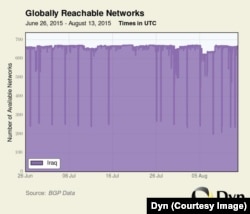What reportedly began as an effort by the Iraqi government to prevent cheating on national school exams has grown into an unexplained series of periodic, regular cuts to Internet access across that nation.
Beginning on June 27 at 5 a.m. local time, access to the Internet across Iraq was sudden and drastically reduced, effectively shutting down Iraq’s Internet.
As detailed by Dyn, an Internet performance company, the service cut lasted exactly three hours, and full access was restored immediately at 8 a.m.
Student exams
The Egyptian news service El Hadas reported at the time that the service interruption corresponded with the beginning of annual placement tests for sixth-graders known as the “sixth ministerial preparatory exams.”
The exams largely determine which students will go on to continue their education, and which will not.
Given those high stakes, the Iraqi Ministry of Communications reportedly severed the Internet to keep students’ friends and relatives from helping them cheat on the tests.
However, while the exams are long since over, the Internet interruptions have continued, following the same pattern of precise, three-hour cuts beginning early in the morning.
Since the first interruption, Dyn has tracked 16 other nationwide Internet cuts.
“It is a strange and unique phenomenon,” says Doug Madory, director of Internet Analysis at Dyn. “I agree that the rationale is very strange although not entirely without precedent.”
Last August, RFE/RL reported that Uzbekistan authorities blocked mobile Internet and text-messaging services nationwide from 8:30 a.m. local time to 1:30 p.m., allegedly to prevent cheating at university entrance exams.
RFE/RL also said that the restrictions “have become an annual practice on exam day as authorities fight against corruption and cheating.”
Different circumstances
But beyond the reported effort to stop cheaters, Madory said the similarities end there.
“In the case of Uzbekistan's shutdown, we did not see a national Internet outage,” Madory told VOA via email. “I believe that the Uzbeks simply shut off mobile-data services. And that was just on a single day, not 16 different days over a month and a half.”
In the past year, the Iraqi government has occasionally cut access to the Web in specific regions. But those cuts were irregular and unpredictable in timing, and Iraqi authorities said they were designed to slow the ability of Islamic State militants to recruit and coordinate attacks.
“There have been reports of the Iraqi government cutting service in places where they were conducting security operations, but these outages are always 5 to 8 a.m. local, which seems unlikely to fit with security raids,” Madory said.
Madory, who monitors Internet traffic around the world and has repeatedly documented service interruptions in Egypt, Iran and many other nations, said he’s not aware of any other instance where a government repeatedly shut off Internet service so openly and regularly.
“It must wreak havoc on businesses trying to operate there that depend on external connectivity,” he said.
Several requests for comment on the outages to the Iraqi ISPs Baghtel and ATS-Iraq were not returned.















